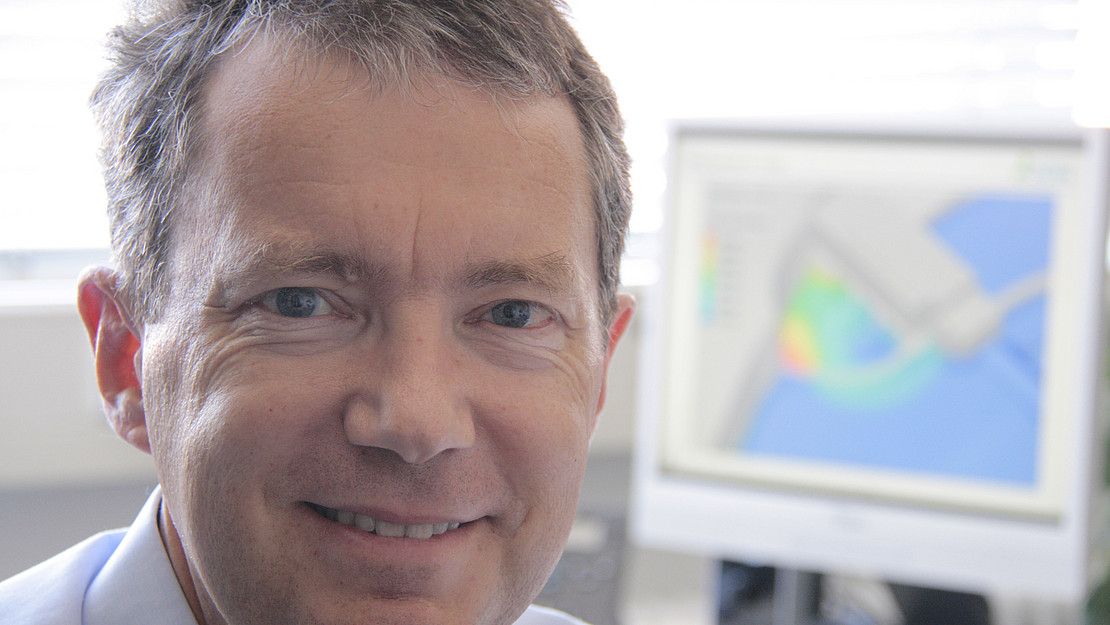This page contains automatically translated content.
Kasseler Wissenschaftler entwickelt Wasserkraftwerke für China
 Image: University of Kassel
Image: University of KasselDie Regierung Chinas baut die Stromerzeugung durch die regenerative Energiequelle Wasserkraft massiv aus: Ziel sind mehr als 1000 neue Anlagen innerhalb der nächsten fünf Jahre. Das soll den wachsenden Energiebedarf des riesigen Landes zumindest zum Teil auf nachhaltige Weise decken. Dabei greift das Land auch auf Hilfe aus der Universität Kassel zurück.
In einem vom Bundesministerium für Bildung, Wissenschaft und Forschung (BMBF) geförderten Projekt arbeitet Prof. Dr.-Ing. Stephan Theobald, Leiter des Fachgebiets Wasserbau und Wasserwirtschaft an der Uni Kassel, an der Optimierung der geplanten Wasserkraftanlagen. Dabei verbessert er einerseits die Strömungssituation an den Kraftwerken durch strömungsgünstige Bauformen und passt sie somit an die jeweiligen topographischen Gegebenheiten an. Andererseits entwickelt er intelligente Kraftwerksregler, welche Nutzungen wie Energieerzeugung und Hochwasserschutz optimieren. Daneben arbeitet Theobald aber auch bereits an der Auswahl geeigneter und ökologisch vertretbarer Standorte und der Einbettung der Wasserkraftwerke in die Ökosysteme mit.
„Da Wasserkraftwerke nicht ohne Vorbereitung in der Realität gebaut oder ohne weiteres geändert werden können, messen wir bestimmte Parameter zunächst an Labormodellen und simulieren den Kraftwerks-Betrieb anschließend mittels Computerprogrammen“, erläutert Theobald. Hierfür werden die Daten der Gewässer und Wasserkraftwerke in entsprechende Computerprogramme eingespeist und die Änderungen berechnet und bewertet. Bei diesen Aufgaben wenden Theobald und sein Team sogenannte hydrodynamisch‑numerische Computermodelle an und entwickeln diese fortlaufend weiter.
Theobalds Fachgebiet verfügt darin über große Erfahrung, der Kasseler Professor ist mit ähnlichen Projekten bereits in Deutschland (z. B. Baden‑Württemberg, Bayern) und international (z.B. Österreich, China) aktiv. „Dabei müssen praktisch immer verschiedene Nutzungen wie Wasserkraft, Hochwasserschutz, Schifffahrt, Tourismus und selbstverständlich auch der Natur‑ und Umweltschutz berücksichtigt werden“, berichtet Theobald.
Die Arbeit am Ausbau der Wasserkraft in China ist eingebettet in ein deutsch-chinesisches Forschungsvorhaben. Der deutsche Vorhabensteil ist auf drei Jahre angelegt. Beteiligt sind weitere Partner aus Deutschland und China. Mehr als eine halbe Million Euro der Fördersumme des BMBF fließen an das Fachgebiet Wasserbau und Wasserwirtschaft der Universität Kassel.
Bild (Foto: Uni Kassel) unter:
http://www.uni-kassel.de/uni/fileadmin/datas/uni/presse/anhaenge/2015/theobald_007.jpg
Kontakt:
Prof. Dr. Stephan Theobald
Universität Kassel
Fachgebiet Wasserbau und Wasserwirtschaft
Bevorzugt per E-Mail:s.theobald[at]uni-kassel[dot]de
Tel.: +49 561 804-2679